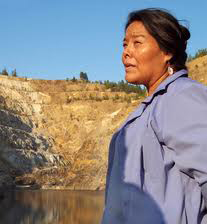A version of this story was originally published in the Fall 2014 UW SRP eBulletin.
 The SHAWL Society (Sovereignty, Health, Air, Water, The Midnite Mine site was listed as a Superfund site by the Environmental Protection Agency (EPA) in 2000. The Dawn Mining Company, LLC, and Newmont USA Limited are the responsible parties for the site and will complete the cleanup work, overseen by the Spokane Tribe and the EPA. For a number of years SHAWL Society documented worker exposure histories and illnesses among former mine workers with a goal of limiting further exposures of tribal members and to increase accountability and transparency of corporate entities and government agencies involved. Since the site was listed, the SHAWL Society has worked with former uranium mine workers to provide them with important information about RECA (Radiation Exposure Compensation Act). RECA is a federal compensation program that allows eligible workers or their survivors to file a compensation benefits claim for certain health effects related to the mining operations. Over the last decade, Deb Abrahamson, executive director of SHAWL Society, played a key role in initiating a successful grant submission to the federal Radiation Exposure Screening and Education Program (RESEP). The grant collaborators include Indian Health Service, Spokane Tribe, Northwest Indian Health Board. In 2012 the Spokane Tribe was awarded a federal RESEP grant which has been active through August of 2014 and also has the opportunity for renewal.
The SHAWL Society (Sovereignty, Health, Air, Water, The Midnite Mine site was listed as a Superfund site by the Environmental Protection Agency (EPA) in 2000. The Dawn Mining Company, LLC, and Newmont USA Limited are the responsible parties for the site and will complete the cleanup work, overseen by the Spokane Tribe and the EPA. For a number of years SHAWL Society documented worker exposure histories and illnesses among former mine workers with a goal of limiting further exposures of tribal members and to increase accountability and transparency of corporate entities and government agencies involved. Since the site was listed, the SHAWL Society has worked with former uranium mine workers to provide them with important information about RECA (Radiation Exposure Compensation Act). RECA is a federal compensation program that allows eligible workers or their survivors to file a compensation benefits claim for certain health effects related to the mining operations. Over the last decade, Deb Abrahamson, executive director of SHAWL Society, played a key role in initiating a successful grant submission to the federal Radiation Exposure Screening and Education Program (RESEP). The grant collaborators include Indian Health Service, Spokane Tribe, Northwest Indian Health Board. In 2012 the Spokane Tribe was awarded a federal RESEP grant which has been active through August of 2014 and also has the opportunity for renewal.
The SHAWL Society is working with the Spokane Tribe and the EPA to apply Technical Assistance Services for Communities (TASC) funds during the ‘Record of Decision’ period of the Superfund Process, to deepen community understanding of the health risks associated with uranium, heavy metals, acid mine drainage and other toxicants have been identified in some local soil and water. Over the last twenty years the SHAWL Society has proven to be an effective leader; raising awareness and broadening knowledge for improved cleanup outcomes.
To learn more about some of content of a Community Workshop held on October 29th
follow this link.
 The SHAWL Society (Sovereignty, Health, Air, Water,
The SHAWL Society (Sovereignty, Health, Air, Water, 
